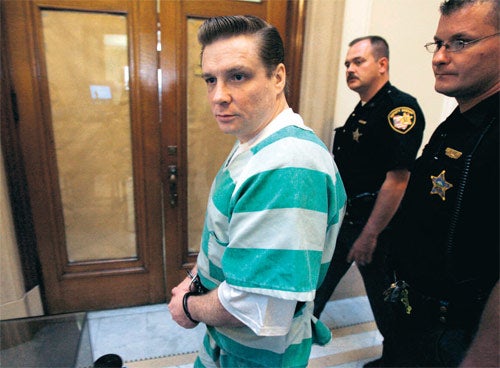Scotsman free after 20 years on US death row

Your support helps us to tell the story
From reproductive rights to climate change to Big Tech, The Independent is on the ground when the story is developing. Whether it's investigating the financials of Elon Musk's pro-Trump PAC or producing our latest documentary, 'The A Word', which shines a light on the American women fighting for reproductive rights, we know how important it is to parse out the facts from the messaging.
At such a critical moment in US history, we need reporters on the ground. Your donation allows us to keep sending journalists to speak to both sides of the story.
The Independent is trusted by Americans across the entire political spectrum. And unlike many other quality news outlets, we choose not to lock Americans out of our reporting and analysis with paywalls. We believe quality journalism should be available to everyone, paid for by those who can afford it.
Your support makes all the difference.Kenny Richey, the Scottish national whose 20 years on Ohio's death row made him a cause clbre for death penalty opponents, will walk free from prison today after the collapse of the murder case against him.
Mr Richey, now 42, has spent more than half his life insisting he had no responsibility for the death of his ex-girlfriend's two-year-old daughter, who perished in a fire in the tiny Ohio town of Columbus Grove in June 1986.
Several fire experts have expressed serious doubt that the blaze was set by anybody, much less Mr Richey, and firefighters at the scene have testified that Mr Richey made strenuous efforts to save the baby.
He and his lawyers have argued that his conviction was the result of inadequate representation at his original trial, in violation of the US Constitution's Sixth Amendment.
Now, after a flurry of appeal court rulings that Mr Richey should either be retried or released, his prosecutors have backed down. In exchange for his freedom, he has agreed to plead no contest to charges of attempted involuntary manslaughter, child endangerment and breaking and entering.
His lawyer, Ken Parsigian, said he would have liked to have been exonerated completely, but preferred to get out of prison now than to wait for a full retrial that had been scheduled for next March.
"This deal was too good to pass up," Mr Parsigian said. "He is pleading guilty to nothing. This is as close as a prosecutor comes to giving up."
Mr Richey is expected to be released immediately following a court hearing this afternoon in Ottawa, not far from Toledo in the northwest corner of the state. He already has a ticket for a plane leaving Dayton at 4.05pm tomorrow and is due to arrive in Edinburgh on Saturday.
"He will be home in time to spend Christmas with his mum for the first time in 25 years," Mr Parsigian said.
Mr Richey moved off death row in August after a ruling in his favour from the Sixth Circuit Court of Appeals and has been held in the Putnam County jail in Ottawa. He has since been working the phones furiously logging almost 10,000 minutes, according to the county sheriff to prepare the terms of his release. For Amnesty International and other campaigning groups who have lobbied on his behalf, the case has been a prime example of the failings of the US criminal justice system and its culture of capital punishment.
Back in 1986, Mr Richey refused a plea bargain that would have spared him execution, because he did not want to admit guilt for a crime he did not commit.
His downfall was that he was drunk on the night of the fire and testified that he could not remember exactly what happened.
His lawyers failed to present more than token evidence to counter the prosecution's claims that he deliberately set the fire that killed two-year-old Cynthia Collins in a fit of a jealous rage against her mother.
On 13 separate occasions, Mr Richey was given an execution date, one of which was postponed just an hour before he was scheduled to be put to death.
He has suffered three heart attacks in the past five years, the most recent in August 2006.
One of the campaigners on his behalf, Karen Torley, grew so close to him that they are now engaged. She was not immediately available for comment.
Join our commenting forum
Join thought-provoking conversations, follow other Independent readers and see their replies
Comments